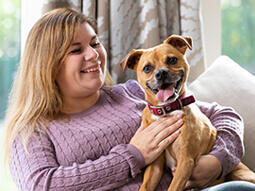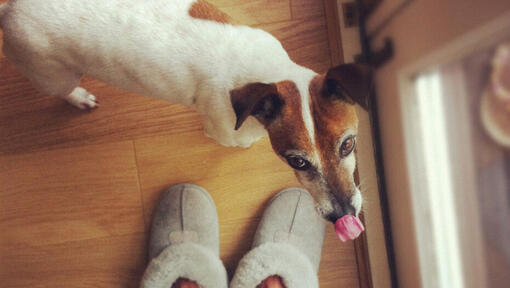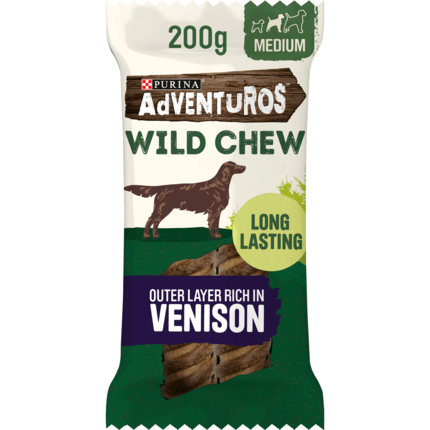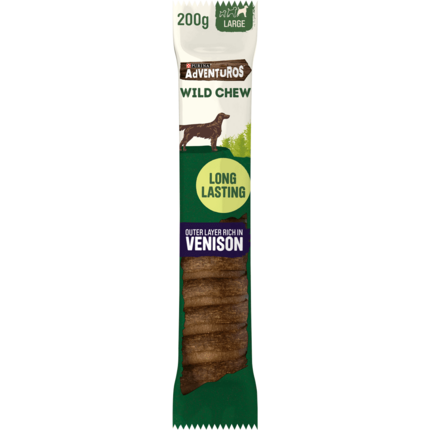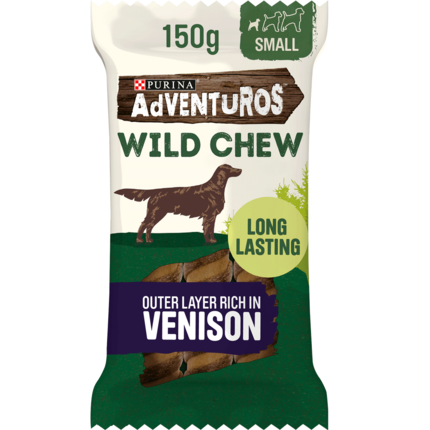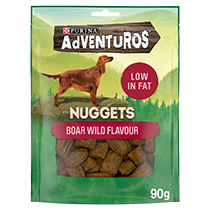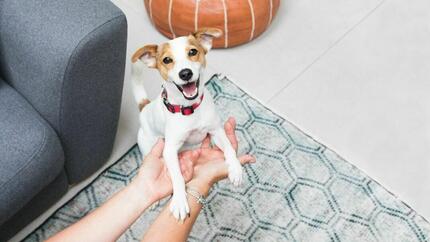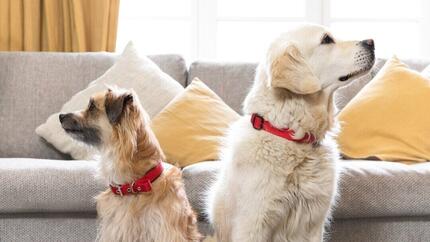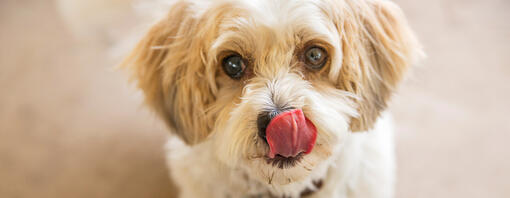
Is your dog always rewarding you with slobbery kisses for no apparent reason? Find out why dogs like to lick things.
Does your dog offer slobbery wet kisses left, right and centre? Whether you are delighted, annoyed or slightly worried, you surely have the same question on your mind: why do dogs lick things?
Why do dogs lick?
There are lots of reasons why a dog licks you – it could be to show you affection or get your attention. It could be because they’ve learnt that you like it. It can also be a sign of stress and anxiety. Dog licking might seem simple but it is a complex behaviour that can have so many different meanings. And if you’re worried that your dog is licking you (or more likely, themselves) too much, it’s worth consulting a vet to see if there is an underlying clinical condition.
1. Showing affection
We all wish we could have a decent conversation with our dog companion. Since words are not an option for your pup, they have to figure out a different way to communicate feelings to you.
The often-slobbery dog kiss is often just their way to show affection and brighten up your day. When your dog licks you, it’s their way of saying how much you mean to them. If you are the kind of person who loves this display of canine affection, your dog will know this and very probably do it more.
2. Attention-seeking behaviour
If you’ve always rewarded your dog’s affectionate licking with attention, don’t be surprised if this ends up being the go-to move whenever your pup wants you to pay attention to them for some reason. This is your dog saying ‘I love you, but there is something I need from you’. You will often know if this sounds like you're your dog. And because it’s not always obvious what your dog might want, you will usually need to investigate the behaviour further. Maybe the water bowl is empty, or they need the toilet, or they are hungry and you’ve forgotten dinner time. Solve the mystery and your dog will probably reward you with copious amounts of tail wagging!
3. Stress or anxiety
If your dog starts licking excessively, especially if they are licking their legs or paws, this could also point to stress or anxiety. Loud noises, moving house or separation-related issues can cause pups enough stress to look for ways to soothe themselves – and both licking and chewing are comforting for dogs.
The act of licking releases endorphins which help the dog calm down in stressful situations. If you’ve ever wondered why dogs start to lick their feet when this isn’t a usual behaviour, one of the reasons could be that their environment has become stressful for some reason and they are looking for comfort.
So, if you see your dog grooming, chewing or licking more than usual, try and work out what is different and possibly causing them stress – and if you can, remove that from their environment. Check with your vet as well to see if there is a clinical cause – as quite often new behaviours that start suddenly, have a medical reason. In the short term, you can look for ways to get their mind off their troubles. Go for a dog walk together, spend some quality time playing with a favourite toy or treat them to a nice meal full of tasty things they adore. If none of these options work, contact a behaviourist to help you get to the bottom of your dog’s stress and worries, and develop a behaviour modification plan.
4. Skin allergy or infections
Dogs lick their feet in an attempt to resolve skin problems too. These might be caused by parasites, allergies, grass seeds, or wounds that you might not have noticed. All of these need veterinary attention, especially as excessive licking and chewing can cause even more harm. Parasites on paws or legs are extremely itchy and will drive your dog crazy if not treated immediately. Make sure you keep your parasite prevention treatment up to date too.
5. Pica
Some dog owners have watched their canine companions lick pretty much every surface in the house. If you are asking yourself ‘Why does my dog lick everything in sight?’, you might be surprised to find out that this strange behaviour is actually a condition called ‘pica’ that makes dogs crave non-food items. If their diet is lacking nutrients this might be enough to send your pup looking for them in the least obvious places, and sometimes it is a behavioural due to boredom, frustration or stress.
A visit to the vet is, as always, your first port of call and you can discuss diet and anything that might be missing from it. Once you have dealt with that and if the licking continues, contact a behaviourist who will help you get to the bottom of any behavioural causes.
However, also be aware that some dogs are very ‘mouth oriented’ (often due to breed and their original ‘job’) and their default way of interacting with their environment is all about licking it, chewing it, or putting it in their mouth! These dogs need plenty of things of their own to chew, gnaw and lick to give them an outlet for this hardwired behaviour.
6. Cognitive dysfunction
Repetitive behaviours such as licking can also point to neurological disorders. Cognitive dysfunction in dogs is a condition found in older canines that is similar to dementia in people, and one of the first symptoms can be excessive licking. Whether a particular spot on their body, the floor or a wall, the reason why your dog is licking more than usual might be a sign of this condition especially if they are in their senior years. Make sure you check if there are other symptoms accompanying this behaviour and arrange a visit to the vet as soon as possible for a diagnosis and to come up with a treatment plan. While it is incurable – as in humans – there are treatments available to slow its progression.
When should dog licking make you worry?
Chances are you will be able to tell when your dog licking activity is unusual for your dog. Because every dog is different in the way they communicate with their owners, excessive licking is usually in the ‘eye of the beholder’, meaning there are no hard rules for establishing what is normal licking and what constitutes signs that a dog is unwell. But if the behaviour is out of character for your dog, has started recently, or there are other symptoms, you should check with a vet to rule out any clinical causes or to discuss a treatment plan.
Keep in mind that any changes to a dog’s routine can set off anxiety in more sensitive pups. Is there a new pet in the house, a new baby, or a change in the schedule? Any new events can disturb your dog’s peace and quiet. So, if you’re wondering why your dog is suddenly licking you or themselves more than usual, try to think of what changes have happened lately.
Find out more about attention-seeking behaviour in dogs and discover how to deal with it if it goes too far. And find out why dogs bark and what it means.
